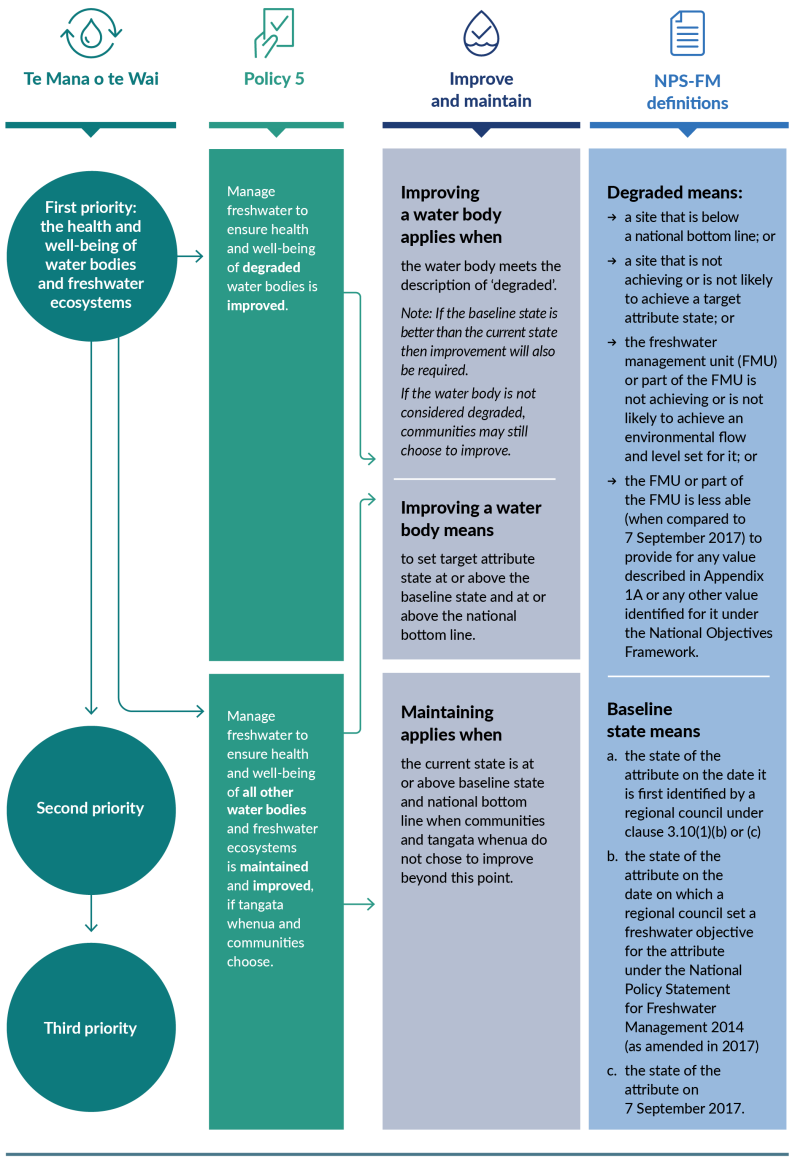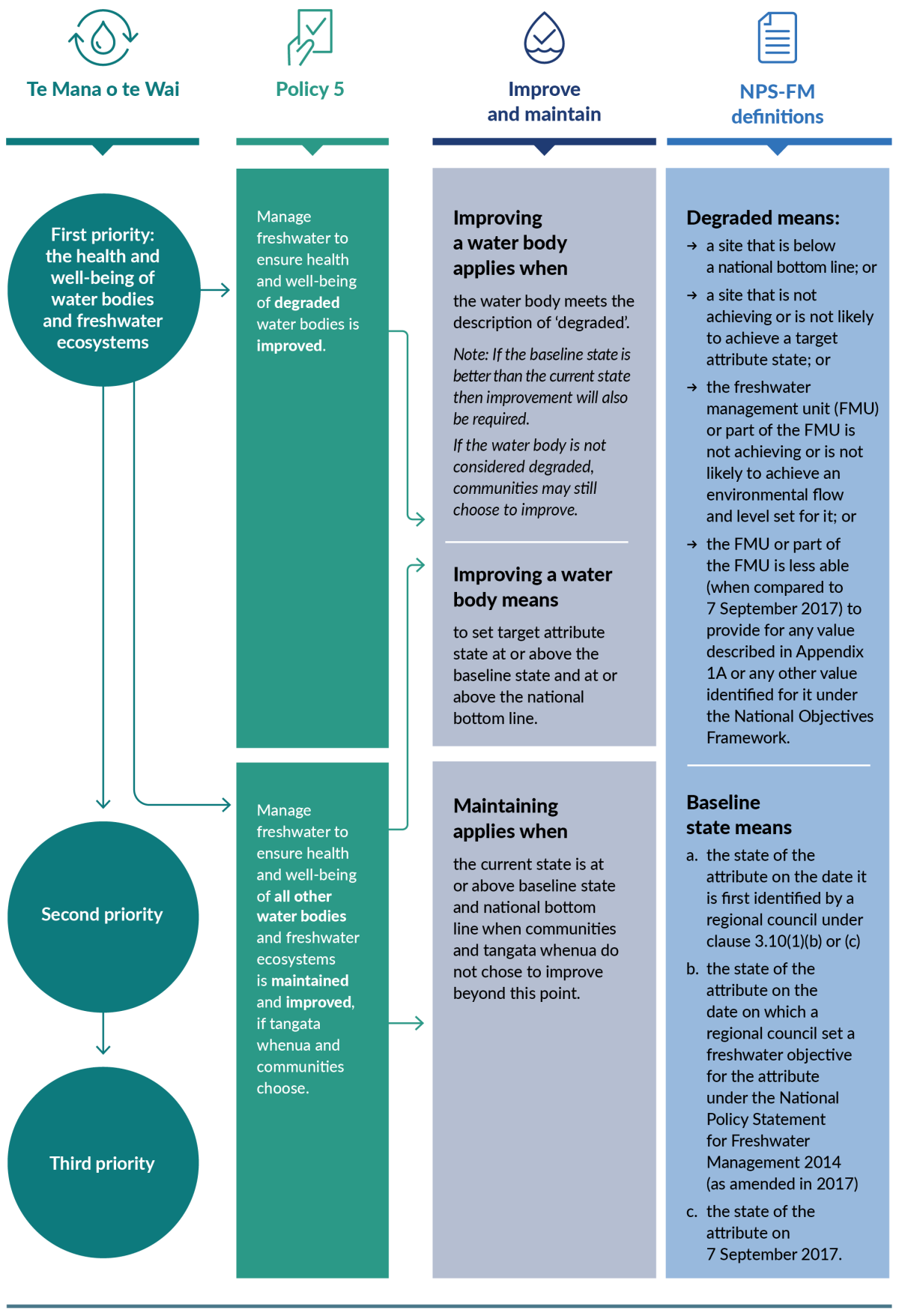Policy 5 and the direction to ‘maintain or improve’


Policy 5: Freshwater is managed (including through a National Objectives Framework) to ensure that:
[…]
degraded, in relation to an FMU or part of an FMU, means that as a result of something other than a naturally occurring process:
degrading, in relation to an FMU or part of an FMU, means any site to which a target attribute state applies is experiencing, or is likely to experience, as a result of something other than a naturally occurring process, a deteriorating trend (as assessed under clause 3.19)
Policy 5 directs a key outcome: to improve degraded water bodies, and maintain all other water bodies, or improve them if communities so choose.
‘Degraded’ water bodies are those that:
One element of the test for degrading is if a water body is below its TAS. A TAS must be set at or above the attribute’s ‘baseline state’. The baseline is the best state out of the following:
For more on TASs and baseline states, see the section Clause 3.12: Achieving target attribute states and environmental outcomes.
Figure 1 sets out the policy direction and definitions of Policy 5.

Infographic describing how Te Mana o te Wai informs Policy 5 and the resulting decisions on whether to improve or maintain the water quality of a water body. The definition of ‘degraded’ and ‘baseline state’ in this infographic helps to further clarify what improve and maintain mean in the context of freshwater management.
Te Mana o te Wai
First priority flows into Policy 5.
Policy 5
Both clauses under Policy 5 flow into the next two clauses.
Improve and maintain
The second clause under Policy 5 flows into the following clause under Improve and Maintain.
NPS-FM definitions applying to flowchart
Degraded means:
Baseline state means:

Infographic describing how Te Mana o te Wai informs Policy 5 and the resulting decisions on whether to improve or maintain the water quality of a water body. The definition of ‘degraded’ and ‘baseline state’ in this infographic helps to further clarify what improve and maintain mean in the context of freshwater management.
Te Mana o te Wai
First priority flows into Policy 5.
Policy 5
Both clauses under Policy 5 flow into the next two clauses.
Improve and maintain
The second clause under Policy 5 flows into the following clause under Improve and Maintain.
NPS-FM definitions applying to flowchart
Degraded means:
Baseline state means:
Under Policy 5, and these definitions, water bodies must be at least maintained. Maintenance within a band is not provided for, as it was in previous versions of the NPS-FM, and so degradation within a band is not provided for.
Water bodies may not be allowed to decline below their baseline state, and if they are below the national bottom line they must be improved (at least to the national bottom line). Communities may also choose to improve them above their baseline state and above national bottom lines. For example, they may want to restore the water quality of a stream that has been degraded for many years, so that it is safe to swim in.
The direction to maintain and improve water bodies has a profound effect on all decisions about freshwater: it does not allow decision-makers to let water bodies decline. For example, you may not put additional pollution into a water body. There is no ‘pollution headroom’ in a water body, you can only add contaminant discharges if you remove, reduce or fully mitigate the effect of the existing discharges of that contaminant.
The direction of Policy 5 to ‘maintain or improve’ applies across the whole region, across the entire freshwater management unit and over time. It is not appropriate to:
Unlike previous versions of the NPS-FM, the current version does not take an ‘overall’ or ‘unders and overs’ approach to ‘maintain or improve’. This is not consistent with the requirement to give effect to Te Mana o te Wai in all water bodies.
Policy 13 of the NPS-FM requires councils to monitor water bodies and to act if there is degradation or a deteriorating trend. (For direction on deteriorating trends, see the section Clause 3.20: Responding to degradation.)

Policy 5 and the direction to ‘maintain or improve’
July 2022
© Ministry for the Environment